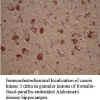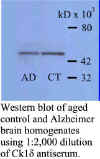The casein kinase 1 (CK1) family of protein
kinases is common to all eukaryotic cells, with at least 15
sequence-distinct isoforms currently known.
Although the isoforms differ in tissue distribution and subcellular
localization, CK1 kinases share several characteristics in that they
exhibit Ser/Thr-specific protein kinase activity.
CK1 protein kinases contain a
nuclear localization signal and possess a kinesin homology domain, which
is necessary for interactions with microtubules.
CK1 kinases are thought to participate in the regulation of
membrane transport and in the DNA repair process.
CK1d
has been implicated in the regulation of the tumor suppressor p53 and
binds to microtubules, which suggests a regulatory role in mitosis.
CK1d
has been reported to be elevated 30-fold in Alzheimer disease hippocampus
and immunohistochemical localization has shown it to be associated generally with granulovacuolar degeneration and
neurofibrillary tangles. The
overexpression of CK1d
kinase and itís association with tau-containing bodies suggests that it
may play a role in the abnormal phosphorylation of tau.
shown it to be associated generally with granulovacuolar degeneration and
neurofibrillary tangles. The
overexpression of CK1d
kinase and itís association with tau-containing bodies suggests that it
may play a role in the abnormal phosphorylation of tau.
A goat antiserum to a synthetic peptide
that corresponds to amino acids 310-327 of the C-terminus of the human CK1d
is currently available. This antiserum has been shown to be immunoreactive
with the unconjugated immunizing peptide by ELISA.
It will also immunolabel granulovacuolar degeneration in formalin-fixed,
paraffin-embedded AD hippocampus.
Western blot analysis identifies the 47 kD protein in both aged controk
and AD brains. This antibody should be a valuable tool for scientists working to understand
the role of CK1d
in Alzheimerís and other neurodegenerative diseases.
antibody should be a valuable tool for scientists working to understand
the role of CK1d
in Alzheimerís and other neurodegenerative diseases.
This
antiserum was produced using proprietary methodology whereby the peptide
is attached to a carrier that elicits minimal immunoreactivity so that the
antiserum has a higher degree of specificity for the peptide.
Since there is no overwhelming production of interfering antibodies
to the carrier, this antiserum can routinely be used without further
purification. A control
immune serum (Cat no. GPA018E) from a mock immunized animal is available
to be used in conjunction with this antibody as well as the immunizing
peptide (Cat no. HSP023C) which can be used to neutralize immunoreactivity.
Manufacturing
Reference:
Southwest Immunology,
Inc., unpublished results.